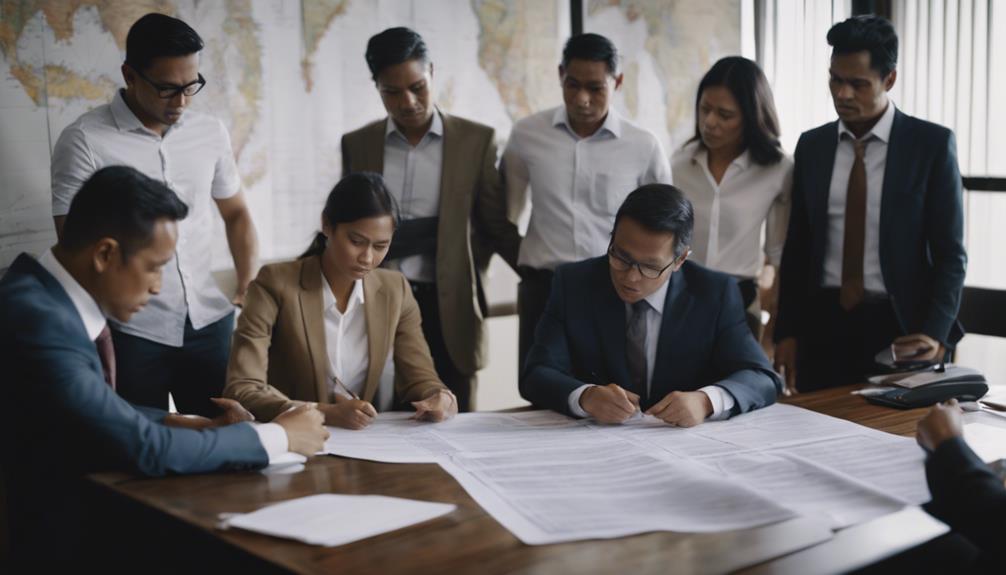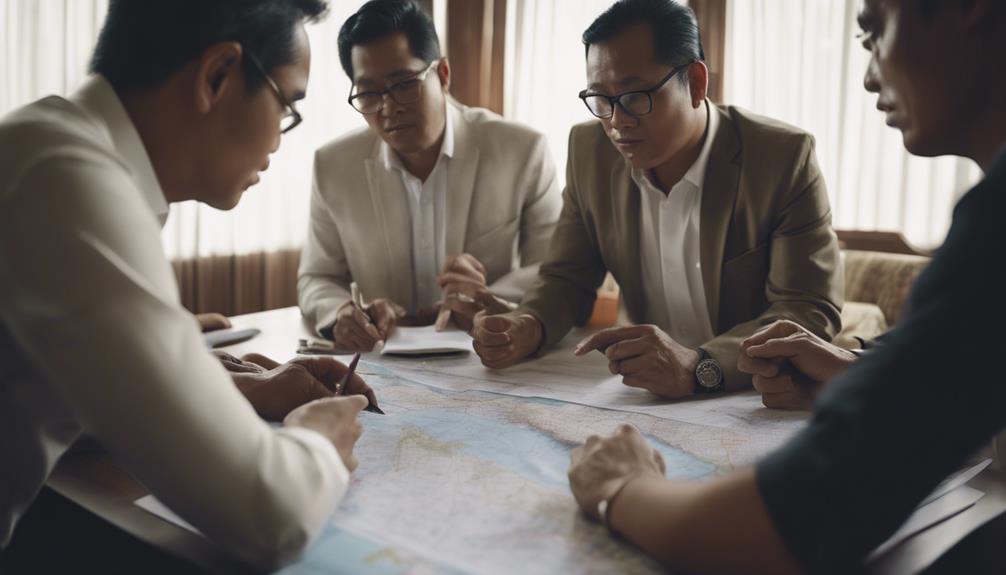Investors exploring Indonesian real estate should note that foreigners can own apartments and offices, but direct land ownership is restricted. Foreigners can secure 80-year leases on Indonesian land since 2010 and 2015. Understanding the different land titles, such as Hak Milik and Hak Guna Bangunan, is essential. MSEs face digitalization challenges due to limited access to credit and support. A solid understanding of Indonesian property ownership laws can give investors an edge and reduce risks. Explore further into the details for a thorough view of the regulations governing property ownership in Indonesia.
Key Takeaways
- Foreigners can acquire apartments and office spaces but cannot own land directly.
- Right to Use titles allow for land and home purchases by foreigners.
- Understanding land titles like Hak Milik, Hak Guna Bangunan, and Hak Pakai is crucial.
- Indonesian property ownership laws prohibit direct land ownership by foreigners.
- Knowledge of property ownership laws mitigates risks and provides a competitive edge for investors.
Foreign Property Ownership Regulations
Foreigners in Indonesia can acquire apartments and office spaces but are prohibited from direct land ownership, as per the country's property ownership laws.
However, regulations in 2010 and 2015 have allowed foreigners to hold 80-year leases on Indonesian land.
One alternative for foreign ownership is the Right to Use title, which permits the purchase of land or homes in Indonesia.
Understanding Indonesian property ownership laws, including the restrictions on direct land ownership for foreigners and the available alternatives like long-term leases and Right to Use titles, is essential for making informed investment decisions in the Indonesian real estate market.
Foreign investors must navigate these regulations to ensure conformity and safeguard their investments in the country.
Types of Land Titles in Indonesia

Understanding the various types of land titles in Indonesia is essential for investors looking to navigate the country's real estate market effectively.
Hak Milik grants full land control but is limited to 5,000 square meters.
Hak Guna Bangunan allows for building on land without owning it outright.
Hak Pakai provides usage rights on state land for 30 years, extendable by 20 years.
Hak Sewa involves renting land for a specified period under agreed terms.
Hak Pengelolaan permits the management of state land for activities such as farming.
Each type of land title comes with specific rights and restrictions, impacting investment decisions.
Hence, investors must have a clear understanding of these titles to make informed choices in the Indonesian property market.
Challenges in Digitalization for MSEs

Investors exploring opportunities in Indonesia's real estate market should also be aware of the challenges faced by Micro and Small Enterprises (MSEs) in digitalization. MSEs encounter obstacles due to a lack of digital literacy, inadequate support structures, and limited access to credit for investing in digital tools.
The significance of digital tools and support services for MSEs in Indonesia can't be overstated. Overcoming these challenges is vital for the growth and sustainability of MSEs in the increasingly digital business landscape.
Understanding the difficulties MSEs face in digitalization is essential for investors looking to engage with smaller enterprises in Indonesia and support their advancement in the digital domain.
Access to Credit for MSEs

Access to credit is an essential factor impacting the growth and sustainability of Micro and Small Enterprises (MSEs) in Indonesia. MSEs often face challenges in accessing credit and loans, hindering their ability to expand operations, invest in technology, and innovate.
Limited access to credit can restrict MSEs from seizing growth opportunities and competing effectively in the market. To improve this situation, solutions such as tailored financial products, simplified loan procedures, and financial literacy programs can enhance access to credit for MSEs in Indonesia.
Financial institutions play a pivotal role in supporting MSEs by providing them with appropriate credit and loan facilities, enabling them to thrive, create jobs, and contribute to the country's economic development.
Importance of Property Ownership Understanding

MSEs in Indonesia can benefit greatly from a thorough grasp of property ownership laws and regulations to make informed investment decisions in the real estate market. Understanding the Indonesian Agrarian Law and the nuances of different land titles is essential for investors looking to navigate the property landscape effectively.
By delving into the specifics of property ownership, investors can align their investment strategies with long-term goals and mitigate risks associated with unclear ownership structures. With the Indonesian property market offering various land titles, having a detailed understanding of these titles can provide investors with a competitive edge and enhance their ability to capitalize on lucrative opportunities.
Essentially, a deep understanding of property ownership laws is vital for investors seeking success in Indonesia's real estate sector.
Frequently Asked Questions
Can Foreigners Own Land in Indonesia for Commercial Purposes?
Foreigners can't own land in Indonesia for commercial purposes. However, they can purchase apartments and office spaces. Indonesian laws permit foreigners to hold 80-year leases on land and acquire property through Right to Use titles.
What Restrictions Apply to Foreign Ownership of Property in Indonesia?
Foreign ownership of property in Indonesia includes restrictions on direct land ownership by foreigners. However, laws allow 80-year leases and Right to Use titles for property acquisition. Understanding these regulations is essential for informed investment decisions.
How Can MSES Overcome Barriers to Digitalization in Indonesia?
MSEs in Indonesia can overcome digitalization barriers by improving digital literacy, enhancing support structures, and expanding access to credit. These efforts are essential for fostering growth, innovation, and sustainability in the digital landscape.
Are There Alternative Financing Options for MSES in Indonesia?
When it comes to alternative financing options for MSEs in Indonesia, thinking outside the box can open doors to growth and innovation. Exploring diverse avenues like peer-to-peer lending or microfinance can pave new paths to success.
How Do Property Ownership Laws in Indonesia Impact Investment Decisions?
Property ownership laws in Indonesia impact investment decisions by outlining ownership restrictions for foreigners, varying land titles, and lease durations. Understanding these laws is essential for investors to navigate the real estate market effectively.
Conclusion
To sum up, delving into the intricacies of Indonesian property ownership laws is essential for investors looking to navigate the real estate market successfully.
By understanding the foreign ownership restrictions, types of land titles, and challenges faced by MSEs, investors can make informed decisions and align their investments with long-term goals.
Remember, knowledge is power when it comes to seizing opportunities in the Indonesian property market.










